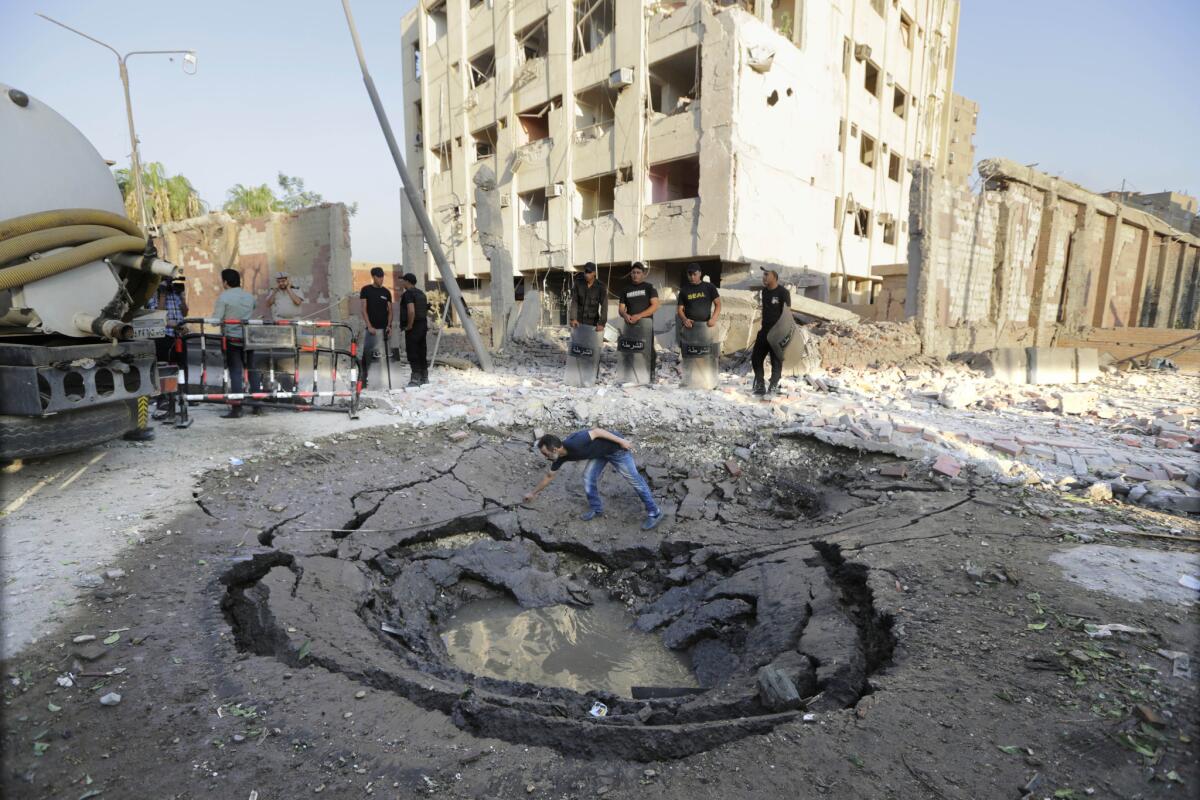Egypt’s grim summer: Islamic State affiliate claims latest bombing

An Egyptian worker checks a hole in the street after a bombing in Cairo that wounded dozens. Islamic State claimed responsibility.
- Share via
reporting from cairo — It’s been a very hot summer in Egypt, with not only more scorching temperatures than usual, but an accelerating tempo of violence.
Rights groups and political opponents blame increasingly repressive policies by the government of President Abdel Fattah Sisi for fueling extremist sentiment.
The Sisi government says Islamic terrorists are seeking to undermine Egypt’s security and its economy, which are closely intertwined.
As has been the case across the region, the militant group Islamic State has added an element of both unpredictability and calculated cruelty, thriving on the very turmoil it helps spawn. Egypt is still a model of stability compared with neighbors such as Libya, but its economic touchstones of foreign investment and tourism are both vulnerable to violent episodes.
NEWSLETTER: Get the day’s top headlines from Times Editor Davan Maharaj >>
The latest of those came Thursday, when militants loyal to Islamic State claimed responsibility for a powerful car bomb that detonated before dawn outside a security headquarters on Cairo’s run-down northern outskirts, causing dozens of injuries.
With a roar that echoed across much of the city, the explosion shattered the facade of the National Security Agency building and damaged nearby structures. The blast, which authorities said wounded 29 people, including six police officers, was the first of its kind since Egypt put a tough new anti-terrorism law into force this week.
In an online claim of responsibility, Egypt-based Islamic State loyalists appeared to be expanding their ambitions. Previously, those claiming allegiance to the group have called themselves Sinai Province, after the peninsula where an Islamic insurgency is centered. The latest statement instead referred simply to Islamic State in Egypt.
Local affiliates of the Sunni Muslim extremist group — which over the past year have sprung up across North Africa, far from the organization’s heartland in Syria and Iraq — generally use a geographic designator in their names, referring to territory they aspire to control.
Thursday’s statement, which could not be independently verified, was posted on Twitter bearing the Islamic State logo and in a format employed in previous claims, using an account associated with supporters of the group. It declared that “soldiers of the caliphate” had carried out the bombing in retaliation for a raid by security forces last year north of Cairo.
Six militants were killed in the March 2014 raid, and six others were condemned to death and subsequently executed.
Sisi has made the fight against Islamic militant groups the centerpiece of his authoritarian-minded administration. Despite his efforts to promote an image of stability, though, attacks on security targets have grown more intense in the two years since Egyptian security forces killed more than 800 people in a crackdown on supporters of ousted President Mohamed Morsi, an Islamist.
Hundreds more have since died in street clashes with the police and army, and tens of thousands of Morsi supporters are imprisoned. Morsi himself has been sentenced to death.
The bloodshed has brought grim new milestones. Last week, Sinai Province said it had beheaded a Croatian working for an oil-exploration firm, abducted earlier on the outskirts of Cairo — the first Westerner kidnapped and killed by militants since Sisi came to power. In June, Egypt’s chief prosecutor, Hisham Barakat, was assassinated by a massive bomb in a tightly guarded Cairo neighborhood. He was the highest-ranking state official to die in the current wave of violence.
At Barakat’s funeral, Sisi vowed that Egypt’s enemies would pay the price.
In Thursday’s attack, an assailant parked an explosives-laden vehicle outside the security building and fled on a motorcycle, the Interior Ministry said in a statement. The method appeared similar to that used in a bombing that struck the Italian consulate in the center of Cairo last month, killing one person.
State media cited the Health Ministry as providing the injury toll of 29 in Thursday’s bombing, and the Interior Ministry said six of those hurt were police officers.
Sisi has blamed Morsi’s Muslim Brotherhood for a string of attacks against security forces and police and army installations, even when others assert responsibility. Islamic State-affiliated militants have emerged as the most lethal of the groups operating in the Sinai peninsula and elsewhere in Egypt.
SIGN UP for the free Great Reads newsletter >>
In July, Islamic State fighters staged a complex and concerted attack against police and the military in the northern Sinai, briefly overrunning a town. Egypt claimed to have killed more than 100 militants in repelling the assault and acknowledged the deaths of just 21 troops, though several news reports at the time put the military toll at about three times that number.
That led to a provision in the new anti-terror law calling for heavy fines against journalists whose accounts of militant attacks diverge from official statements issued by Egyptian authorities. The measure, which was widely criticized by human rights groups, also broadens police powers and expands the definition of terrorist activity.
Special correspondent Amro Hassan contributed to this report.
Follow @laurakingLAT on Twitter for news out of the Middle East
ALSO:
Israel suspends detention of hunger-striking Palestinian prisoner with brain damage
Islamic State video urges followers in Turkey to rise up against Erdogan
U.S. boosts support role in Saudi-led airstrikes on Yemen
More to Read
Sign up for Essential California
The most important California stories and recommendations in your inbox every morning.
You may occasionally receive promotional content from the Los Angeles Times.










